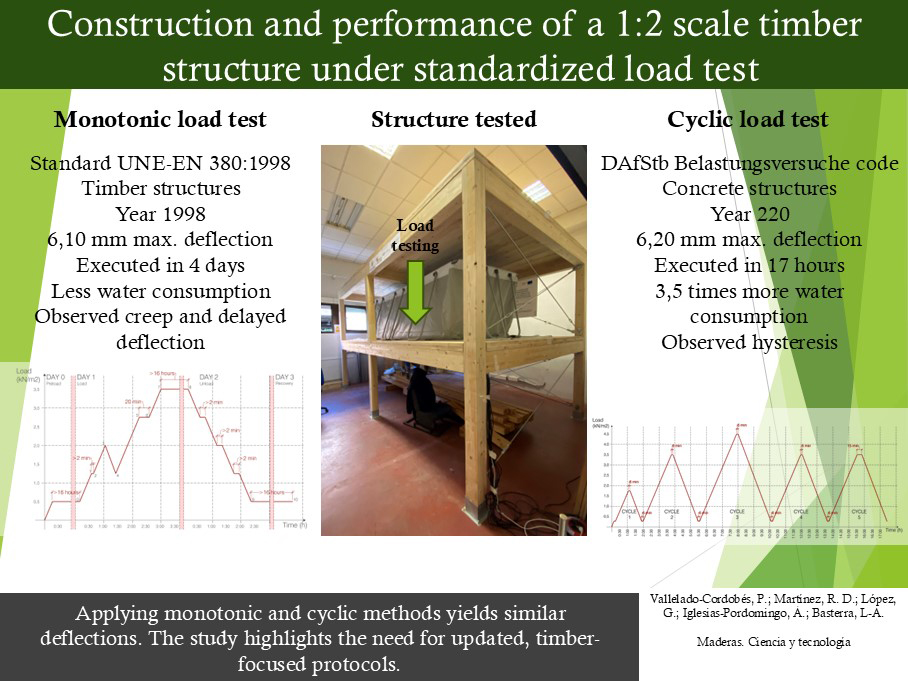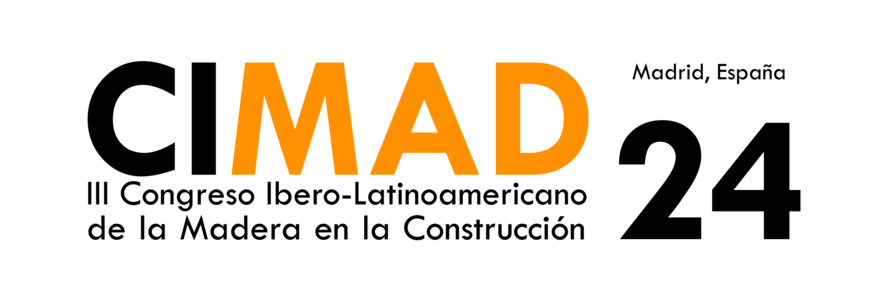Construction and performance of a 1:2 scale timber structure under standardized load tests
DOI:
https://doi.org/10.22320/s0718221x/2025.20Keywords:
Cyclic load testing, timber structure, load testing standards, static load testing, structural performanceAbstract
Timber’s growing prominence in both new construction and heritage rehabilitation demands reliable methods to evaluate structural safety. However, most current load-testing protocols target concrete and overlook key timber-specific characteristics such as creep, delayed deflection, and service classes. This study addresses these gaps by investigating a 1:2 scale two-story timber prototype subjected to monotonic (UNE-EN 380) and cyclic (DAfStb) load tests. A comprehensive array of sensors captured time-dependent deflections and post-unloading recovery, revealing pronounced creep effects and highlighting the limits of existing standards to account for timber’s long-term deformation. Although cyclic tests can be completed more quickly, they do not adequately track delayed deflection behaviour crucial to timber structures; by contrast, the sustained-load protocols demanded by monotonic tests provide meaningful insights into creep and sostenibility considerations (such as water usage). These findings underscore the need to develop updated, consensus-based load-testing guidelines that better reflect timber’s unique mechanical response. Such standards would enable more accurate assessments of timber floors, roofs, and frames in both historic and contemporary contexts.
Downloads
References
ACI. 2019. Building Code Requirements for Structural Concrete. ACI 318S-05. ACI Committee 318. Farmington Hills, MI, USA.
ACI. 2014. Code requirements for load testing of existing concrete structures. ACI 437.2-13. ACI Committee 437. Farmington Hills, MI, USA.
Bolle, G.; Schacht, G.; Marx, S. 2010. Geschichtliche Entwicklung und aktuelle Praxis der Probebelastung Teil 1: Geschichtliche Entwicklung im 19. und Anfang des 20. Jahrhunderts. Bautechnik 87(11): 700-707. https://doi.org/10.1002/BATE.201010047
Brent-Hall, W.; Tsai, M. 1989. Load testing, structural reliability and test evaluation. Structural Safety 6(2-4): 285- 302. https://doi.org/10.1016/0167-4730(89)90028-3
BS. 1985. Structural use of concrete - Part 2: Code of practice for special circumstances. BS 8110-2:1985. BS. London. UK. Código Estructural. 2021. Real Decreto 470/2021, de 29 de junio, por el que se aprueba el Código Estructural. Madrid. Spain.
Deutsche Ausschuss für Stahlbeton. DAfStb. 2020. Belastungsversuche an Betonbauwerken. DAfStb. Berlin. Germany.
De Luca, A.; Galati, N.; Nanni, A.; Alkhrdaji, T. 2007. In-Situ Load Testing: A Theoretical Procedure to Design a Diagnostic Cyclic Load Test on a Reinforced Concrete Two-Way Slab Floor System. Key Engineering Materials 347: 165-172. https://doi.org/10.4028www.scientific.net/kem.347.165
De Luca, A.; Zadeh, H. J.; Nanni, A. 2013. In-Situ Load Testing of a One-Way Reinforced Concrete Slab. Journal of Performance of Constructed Facilities 347: 167-172. https://doi.org/10.4028/www.scientific.net/KEM.347.165
Fred-Moses, B.; Paul Lebet, J.; Bez, R. 1994. Applications of Field Testing to Bridge Evaluation. Journal of Structural Engineering, 120(6): 1745-1762. https://doi.org/10.1061/(ASCE)0733-9445(1994)120:6(1745)
Galati, N.; Alkhrdaji, T. 2009. In-situ evaluation of structures using load testing. Proceedings of the Fifth Forensic Engineering Congress 657-667. Washington DC. USA. https://doi.org/10.1061/41082(362)67
Galati, N.; Nanni, A.; Gustavo Tumialan, J.; Ziehl, P.H. 2008. In-Situ Evaluation of Two Concrete Slab Systems. I: Load Determination and Loading Procedure. Journal of Performance of Constructed Facilities 22(4): 207- 216. https://doi.org/10.1061/(asce)0887-3828(2008)22:4(207)
ISO. 2010. Bases for design of structures - Assessment of existing structures. ISO 13822:2010. ISO.
Jones, D. S.; Oliver, C. W. 1978. The practical aspects of load testing. The Structural Engineer 56A: 353-356. https://www.istructe.org/journal/volumes/volume-56-(published-in-1978)/issue-12/the-practical-aspects-of-load-test-ing/
Lantsoght, E.O.L.; van der Veen, C.; de Boer, A.; Hordijk, D.A. 2017. State-of-the-art on load testing of concrete bridges. Engineering Structures 150: 231-241. https://doi.org/10.1016/J.ENGSTRUCT.2017.07.050
Loebjinski, M.; Linke, G.; Rug, W.; Pasternak, H. 2019. Evaluation of existing timber structures – current standards for the assessment and evaluation in Germany and Europe. Proceedings of the Fifth International Conference on Structural Health Assessment of Timber Structures. 25-27 September 2019, Guimarães, Portugal. http://www.holzbau-statik.de/ibr/downloads/05_bestand/070SHATIS%202019_Loebjinski-Linke-Rug-Pasternak.pdf
Luechinger, P.; Fischer, J.; Chrysostomou, C.; Dieteren, G.; Dimova, S.; Denton, S.; Landon, F.; Leivestad, S.; Malakatas, N.; Mancini, G.; Markova, J.; Matthews, S.; Nolan, T.; Nutti, C.; Osmani, E.; Pinto, A.; Rønnow, G.; Schnell, J.; Tanner, P. 2015. New European technical rules for the assessment and retrofitting of existing structures. European Commission. Joint Research Centre. Institute for the Protection and the Security of the Citizen. Luxembourg, Luxembourg. https://doi.org/10.2788/052881
Marx, S.; Bolle, G.; Schacht, G. 2011. Loading Tests of Existing Concrete Structures-Historical Development and Present Practise. Proceedings of 4th International fib Congress. Prague, Czech Republic. https://www.research-gate.net/publication/265597845
Menzies, J.B. 1978. Load testing of concrete building structures. The Structural Engineer 56A: 347-353. https://www.istructe.org/journal/volumes/volume-56-(published-in-1978)/issue-12/load-testing-of-concrete-building-struc-tures/
Olaszek, P.; Świt, G.; Casas, J.R. 2010. Proof load testing supported by acoustic emission. An example of application. Bridge Maintenance, Safety, Management and Life-Cycle Optimization - Proceedings of the 5th Internation- al Conference on Bridge Maintenance, Safety and Management: 484-491. 11-15 July 2010, Philadelphia, PA, USA https://doi.org/10.1201/b10430-65
Reschel, E.; Vielhaber, J. 2003. Loading test involving historic structures, opportunity or risk? Proceedings of the First International Congress on Contruction History: 1729-1740. 20-24 June 2003, Madrid, Spain. http://www.sedhc.es/biblioteca/actas/CIHC1_162_Reuschel%20E.pdf
Schacht, G.; Bolle, G.; Marx, S. 2016. Belastungsversuche - Internationaler Stand des Wissens. Bautechnik, S3(2): 85-97. https://doi.org/10.1002/BATE.201500097
The Institution of Structural Engineers. 2010. Appraisal of existing structures. Institution of Structural Engi- neers. London, UK. ISBN 9781906335045
Tumialan, G.; Galati, N.; Nanni, A. 2014. In-Situ Load Testing of Concrete Structures. Part 1: Rationale, Objectives and Execution. Structural Testing: 10-12. April 2014. https://www.structuremag.org/article/in-situ-load-testing-of-concrete-structures-part-1/
UNE. 1986. Realización de ensayos estáticos de puesta en carga sobre estructuras de piso en edificación. UNE 7-457-86. Instituto Español de Normalización IRANOR. Madrid, Spain.
UNE. 2016. Structural timber. Strenght classes. UNE-EN 338. Asociación Española de Normalización AENOR. Madrid, Spain.
UNE. 1998. Estructuras de madera. Métodos de ensayo. Principios generales para los ensayos de carga estática.
UNE-EN 380. Asociación Española de Normalización AENOR. Madrid, Spain.
UNE. 1996. Estructuras de madera. Métodos de ensayo. Ensayo para la determinación de la resistencia y rigidez de las cerchas. UNE-EN 595. Asociación Española de Normalización AENOR. Madrid, Spain.
UNE. 2022. Timber structures. Glued laminated timber and glued solid timber. Requirements. UNE-EN 14080. Asociación Española de Normalización AENOR. Madrid, Spain.
Veneziano, D.; Galeota, D.; Giammatteo, M. M. 1984. Analysis of bridge proof-load data I: Model and statistical procedures. Structural Safety 2(2): 91-104. https://doi.org/10.1016/0167-4730(84)90013-4

Downloads
Published
How to Cite
Issue
Section
License

This work is licensed under a Creative Commons Attribution 4.0 International License.
Los autores/as conservarán sus derechos de autor y garantizarán a la revista el derecho de primera publicación de su obra, el cuál estará simultáneamente sujeto a la Licencia de Reconocimiento de Creative Commons CC-BY que permite a terceros compartir la obra siempre que se indique su autor y su primera publicación esta revista.



































